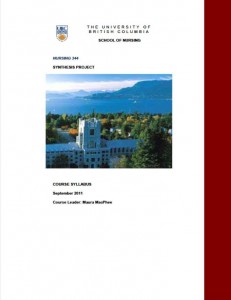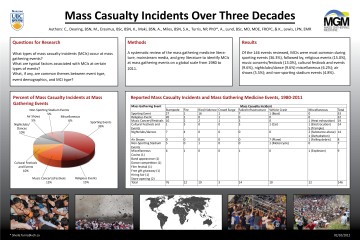
UBC Nursing Synthesis Program
Drs. Sheila Turris, Adam Lund, and Ms. Kerrie Lewis are presently (2011-2012) facilitating two groups of UBC Nursing students in the following research synthesis projects:
Ready or Not: Describing the Occurrence of Mass Casualty Incidents During Mass Gatherings
Purpose: Through a review of the literature, we seek to understand whether patterns exist in the types of MCIs according the type of event. Our research question(s) are:
- What types of MCIs occur at mass gathering events?
- What are typical causes of MCIs at certain types of events?
- What, if any, are common themes between event type, event demographics, and MCI type?
Methodology: Synthesis of the mass gathering medicine literature from 1980 to 2011
- Dearing, C. – BSN
- Erasmus, M. – BSc, BSN
- Maki, K – BSN
- Miles, A – BSN
Emergency Departments and the Impact of Mass Gathering Events
Background: The emergency department (ED) is widely recognized as a challenging work environment, but factors contributing to these perceived challenges, particularly in relation to the ebb and flow of the work, are not fully understood. In this project, we seek to understand the various factors that contribute to the “busyness” of the ED, as perceived by health care professionals and as measured by researchers.
Purpose: The analysis and critique of existing methods for measuring “busyness” in the ED.
Methodology: Literature synthesis.
LEARNING OUTCOMES AND OBJECTIVES
Use critical inquiry in the synthesis and application of knowledge in a field of nursing practice.
- Engage in critical problem solving
- Draw upon research evidence, experiential knowledge, the knowledge from other disciplines, and nursing’s distinct disciplinary perspective
- Critically analyze the social context of health and health care
Strengthen your own ability to engage relationally in the synthesis and application of knowledge in a field of nursing practice.
- Consistently collaborate with faculty, peers, and other healthcare providers in the process of learning
- Consistently apply communication competencies to strengthen collaborations
Engage in interprofessional practice in the synthesis and application of knowledge in a field of nursing practice.
Work collaboratively on your synthesis project with the assigned faculty facilitator, practice partner, other professions (as appropriate), and your project team peers.
